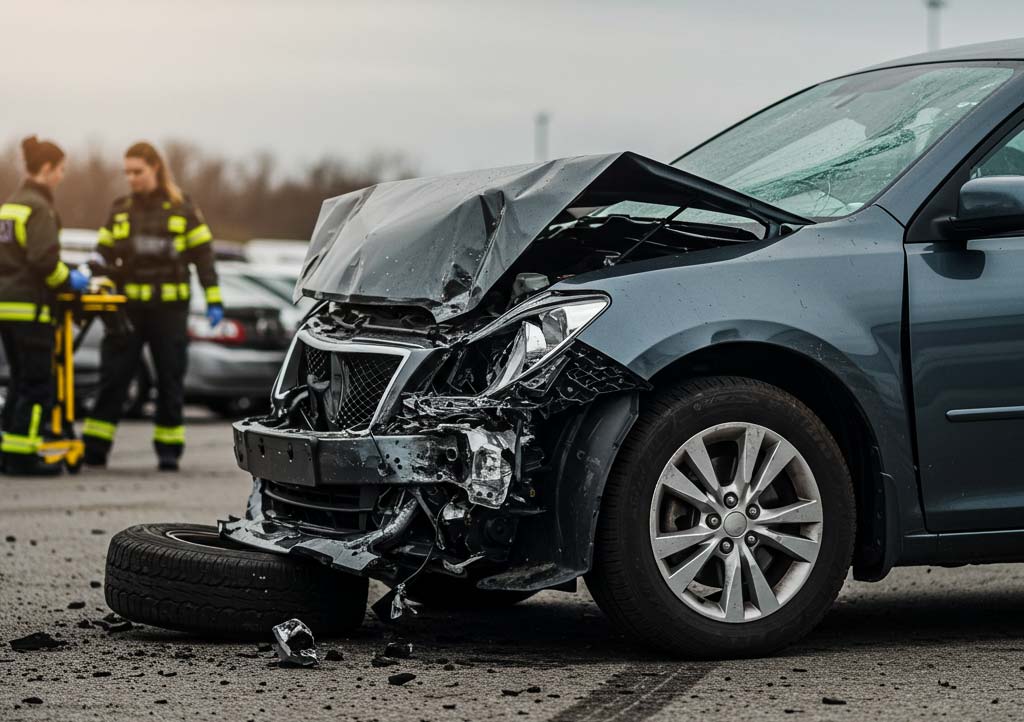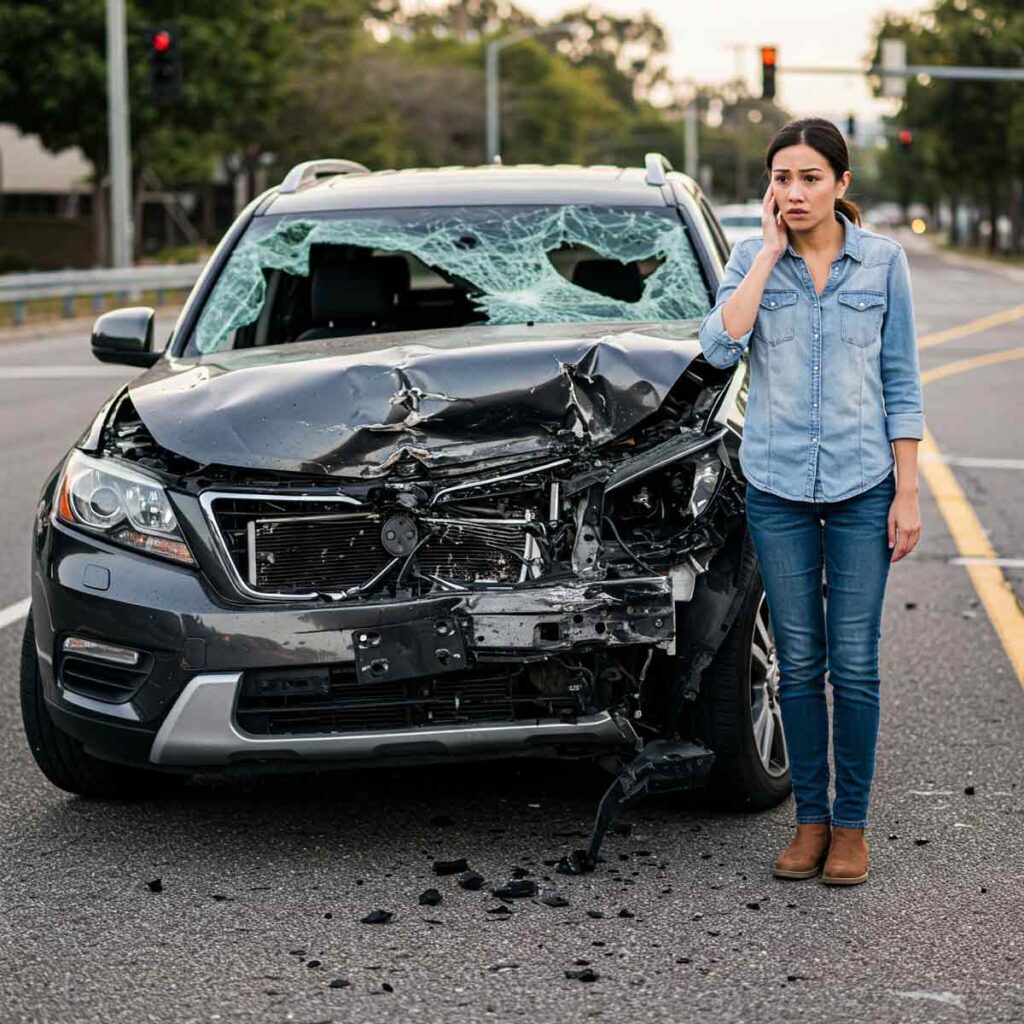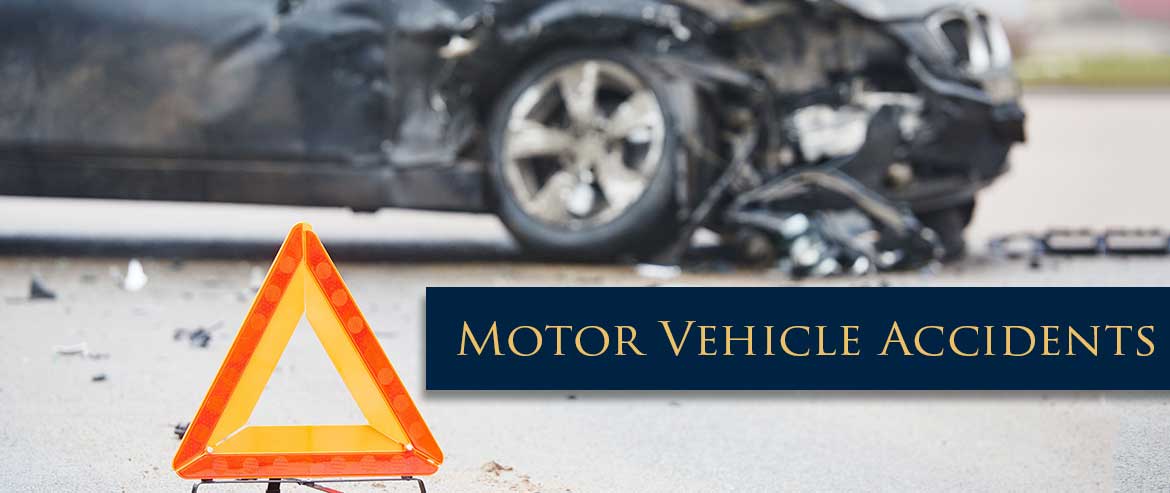While many car accidents are simple fender-benders resulting in minimal damage, automobile accidents remain one of the most common causes of serious injury and death in New York. As a result, automobile, truck, motorcycle, and pedestrian knockdown accident lawsuits are among the most frequent type of civil suits filed by Berkowitz & Weitz Law, P.C., and an area in which we have over two decades of experience.
Recent Car Accident Statistics in New York City
New York City, known for its busy streets and bustling traffic, continues to experience a significant number of car accidents. The city’s dense population and the constant stream of commuters and tourists contribute to the frequent collisions.
Traffic Accidents in NYC
In New York City, there are approximately 820 car accidents per day. This translates to around 34 crashes per hour, or one crash every two minutes. This figure underscores the persistent traffic challenges in areas prone to congestion, especially during rush hours.
Impact on Life and Safety
The human impact of these accidents is evident. In New York City, there were 7,936 traffic injuries reported in the first three months of 2025, according to Mayor Adams. These incidents not only result in physical harm but also cause emotional and financial repercussions for those involved.
Fatalities
Tragically, there were 41 traffic deaths during the first three months of 2025, reminding us of the severe consequences that can arise from road accidents. These statistics serve as a stark reminder of the city’s ongoing battle with traffic safety issues.
There are a wide variety of factors for which the driver of a motor vehicle may be found to have been negligent in their operation of that automobile. These include, but are not limited to, driving while intoxicated, speeding, and other traffic violations, failure to yield to other drivers and pedestrians, failures to obey traffic signals and signs, texting while driving, and driving while distracted.
In fact, driver inattention and distraction are among the leading contributors to car accidents. Activities such as texting or talking on a cell phone account for a substantial portion of car crashes. Distracted driving alone caused approximately 28% of all traffic accidents in New York City this year, underscoring its significant impact.
Additional causes of accidents include:
- Unsafe lane changes
- Driving over the speed limit
- Mechanical failure of vehicle components, such as the braking system
Each of these factors contributes to the complexity of traffic safety and highlights the importance of attentive and responsible driving habits. By understanding these causes, we can better address and mitigate the risks associated with negligent driving. Whether you were the driver of an automobile, truck, motorcycle, or you were simply crossing the street, if you are the victim of an accident due to the negligent operation of an automobile, we can help.
Common Injuries from Car Accidents Caused by Negligence

Car accidents can inflict a range of injuries, often resulting from another driver’s carelessness or failure to adhere to road safety. Here’s a breakdown of typical injuries sustained:
Frequent Injuries
- Whiplash: This common neck injury is caused by the sudden back-and-forth movement of the head, placing strain on the neck muscles and ligaments.
- Soft Tissue Damage: Sprains, strains, and bruises fall under this category, involving muscles, ligaments, and tendons.
- Lacerations and Cuts: Sharp objects or shattered glass can cause these injuries, which may require stitches or result in scarring.
- Knee and Leg Injuries: The impact can force knees into the dashboard, leading to bruising, fractures, or ligament injuries.
- Chest Injuries: Such injuries might result from seatbelt compression or impact with the steering wheel, causing bruises, fractures, or serious organ damage.
Catastrophic Injuries
- Traumatic Brain Injuries (TBI): These occur when a strong jolt or blow to the head disrupts normal brain function, possibly leading to long-term cognitive issues.
- Spinal Cord Injuries: Damage here can result in partial or full paralysis, significantly altering one’s lifestyle.
- Multiple Fractures: Severe cases involve breaking several bones, which could require surgery and lengthy rehabilitation.
- Internal Organ Damage: Blunt force trauma may injure vital organs, requiring immediate medical intervention.
- Severe Burns: Fires or hot surfaces during a crash can result in serious burns.
- Amputation: In dire scenarios, limbs may be severed during the accident, or later removed due to the extent of injury.
Long-term Impact
Injuries from car accidents aren’t just immediate concerns. Victims often endure lasting effects that include:
- Chronic Pain: Persistent pain may necessitate ongoing medical treatment.
- Rehabilitation: Recovery often involves extensive physical therapy.
- Lifestyle Changes: Adaptive equipment or home modifications might be necessary to accommodate new physical limitations.
By understanding these potential injuries, you can better appreciate the seriousness of road safety and the consequences of vehicular negligence.
Types of Compensation for Car Accident Victims
Car accidents can drastically alter lives, and understanding the potential compensation available can help victims regain stability. The compensation you may be eligible for depends largely on the severity and impact of your injuries.
Immediate Financial Relief
- Medical Expenses: This covers all past and future medical bills. It includes costs of emergency room visits, surgeries, follow-up appointments, and rehabilitation therapies.
- Lost Income: If your injuries force you to miss work, you can claim compensation for lost wages. This includes future earnings if your ability to work is permanently affected.
Personal and Emotional Costs
- Pain and Suffering: This is compensation for the physical and emotional discomfort caused by the accident and subsequent injuries.
- Emotional and Mental Impact: Severe accidents can lead to conditions like PTSD or depression. Compensation for emotional distress and mental anguish may be available to address these issues.
- Loss of Enjoyment: This refers to the inability to enjoy day-to-day activities or hobbies you once cherished.
Property and Lifestyle Adjustments
- Property Damage: Covers repair or replacement costs for your vehicle and any other personal property damaged in the accident.
- Modifications and Mobility Aids: If your injuries require home modifications or assistive devices (like wheelchairs), these expenses may be covered.
Long-term Considerations
- Diminished Earning Capacity: In cases where the injuries permanently limit your ability to earn a living, you might receive compensation for reduced future earnings.
- Loss of Consortium: If the accident negatively impacts your relationship with a spouse, you may be eligible to claim this particular form of compensation.
Punitive Damages
While less common, punitive damages may be awarded in cases where the at-fault party’s actions were particularly reckless or malicious. These are designed not only to penalize the offender but also to deter similar conduct in the future.
Understanding these categories of compensation can empower victims to pursue the full extent of financial support they are entitled to, aiding in a more comprehensive recovery process.
What Steps Should You Take Immediately After a Car Accident?
Experiencing a car accident can be overwhelming, but knowing the right actions to take can help safeguard your well-being and protect your interests. Here’s a guide on what to do:

1. Prioritize Safety
- Check for Injuries: First and foremost, ensure everyone involved is safe. Assess the condition of passengers and yourself for any injuries. If necessary, call emergency services immediately.
- Move to Safety: If it’s safe, move vehicles out of traffic to prevent further danger.
2. Gather Evidence
- Document the Scene: Use your smartphone to take clear photos of the vehicles, any visible damage, and the location of the accident. Don’t forget to capture traffic signs and signals.
3. Exchange Important Information
- Share Details: Obtain names, contact information, and insurance details from everyone involved. Don’t forget to gather contact information from witnesses, if any.
4. Involve Authorities
- File a Police Report: Always report the accident to the police, no matter how minor it seems. Make sure an official report is created for future reference.
5. Notify Your Insurer
- Contact Your Insurance Company: Inform your insurer about the accident as soon as possible. Provide them with accurate details and any evidence you’ve collected.
6. Keep Thorough Records
- Document Everything: Maintain detailed records of medical visits, repair estimates, and communications related to the accident. This documentation is invaluable for any legal or insurance proceedings.
7. Seek Legal Advice
- Consult a Professional: Consider contacting an attorney with expertise in car accidents to understand your legal rights and options. Acting quickly can help preserve your claim and maximize potential compensation.
By following these steps, you can manage the aftermath of an accident with clarity and assurance, ensuring your health and legal needs are adequately addressed.
Navigating Challenges with Insurance Companies Post-Accident
Dealing with insurance companies after a car accident can be a tough road. Here are some challenges you might encounter:
- Prioritization of Profits Over People: Insurance companies are in the business to make money. Their priority often leans towards protecting their bottom line rather than focusing on your well-being, which might lead to unfair settlement offers.
- Resource Disparity: With substantial resources and experienced legal teams, insurance companies are equipped to defend their interests aggressively. This makes it tricky for individuals to stand their ground, especially if you’re unrepresented.
- Pressure to Settle Quickly and Cheaply: Often, insurers will attempt to close cases swiftly by offering settlements that don’t fully cover your costs. This pressure can be overwhelming, possibly leaving you without sufficient compensation to cover medical expenses, damages, and other losses.
- Complex Communication: The negotiation process with insurance companies can be convoluted, filled with industry jargon and technicalities designed to intimidate or confuse. This complexity can put you at a disadvantage if you’re unsure about your rights or the value of your claim.
- Underestimating Damages: There’s always a risk of undervaluing the full extent of your damages. This includes not just immediate repairs or medical bills, but long-term rehabilitation, lost wages, and pain and suffering.
Overcoming These Challenges
- Legal Representation: Hiring a skilled attorney can significantly level the playing field. They can negotiate on your behalf, ensuring you do not accept low-ball offers.
- Understanding Your Rights: Educating yourself on your rights and the claims process can empower you. The more you know, the better you can advocate for the compensation you deserve.
By staying informed and seeking professional advice, you can better navigate the post-accident landscape, ensuring fairer outcomes against formidable insurance opposition.
Do I Have a viable AUTOMOBILE, TRUCK or MOTORCYCLE ACCIDENTS Case?
Any potential personal injury case requires a detailed understanding of the facts, the processes, and the law. If an accident has impacted your life, you will want to consult with an experienced attorney to see if you should pursue a lawsuit.
When dealing with powerful insurance companies, having legal representation becomes even more critical. These companies are often focused on minimizing their financial liability rather than ensuring your well-being. With extensive resources and skilled legal teams, they aim to settle claims for as little as possible.
Without the guidance of a lawyer, you may be pressured into accepting an offer that falls short of covering your actual expenses. An attorney can act as your advocate, managing all communications with the insurance company and negotiating on your behalf. This ensures that your settlement accurately reflects your needs and the true extent of your damages.
By hiring a lawyer, you level the playing field, gaining someone who is dedicated to fighting for a fair outcome. This support can make a significant difference in the trajectory of your case and the compensation you ultimately receive.
How Can Legal Representation Ensure Fair Compensation After a Car Accident?
Facing the might of insurance companies after a car accident can be daunting. These firms often have vast resources and skilled legal teams dedicated to reducing the amount they pay out. Their priority? Protecting the company’s bottom line, not necessarily your interests.
The Challenge of Going It Alone
Without expert legal advice, there’s a risk you might accept a settlement that doesn’t fully cover your expenses. Insurance companies may pressure you into quick settlements that fall short of addressing the full impact of your injuries and losses.
The Role of Legal Representation
1. Expert Negotiation:
- A seasoned attorney can skillfully negotiate on your behalf, directly communicating with the insurance company to advocate for a fair settlement.
2. Accurate Assessment:
- Lawyers help assess the full extent of your damages, ensuring the compensation sought reflects medical costs, lost wages, and emotional distress.
3. Legal Strategy:
- By employing a strategic approach, attorneys can leverage their knowledge of legal precedents and tactics to strengthen your claim.
4. Protection from Underhanded Tactics:
- With a legal expert, you’re safeguarded against lowball offers and pressure tactics designed to settle claims cheaply.
Peace of Mind
Having legal representation means you don’t walk this path alone. An experienced lawyer provides the guidance and support needed to navigate the complexities of insurance claims, ensuring that your compensation aligns with your true needs.

What Factors Determine the Amount of Compensation in a Car Accident Case?
Navigating the aftermath of a car accident can be overwhelming, especially when trying to understand how much compensation you might receive. Here’s a breakdown of the key factors that will influence the amount:
Severity of Injuries
The extent of your injuries plays a crucial role. Compensation usually correlates directly with the severity of physical harm suffered, encompassing:
- Past and Future Medical Expenses: This includes all medical costs incurred and anticipated in the future.
- Pain and Suffering: The physical and emotional distress caused by the injuries.
Impact on Your Life
How the accident affects your daily life and future prospects is another significant factor:
- Lost Wages and Future Earnings: If injuries hinder your ability to work, you may receive compensation for both lost wages and any reduction in future earning capacity.
- Transportation and Living Modifications: Costs for traveling to medical appointments or modifying your home to accommodate new limitations are considered.
- Loss of Consortium: Compensation for the loss of companionship or support due to injuries.
Emotional and Mental Consequences
Emotional distress can profoundly affect one’s life. If an accident leads to:
- Emotional Distress and Mental Anguish: These damages account for the impact on mental health and emotional well-being.
Property Damage
The financial compensation might also include:
- Vehicle and Property Repair Costs: Reimbursement for damage to your car or other personal property involved in the accident.
Nature of the Defendant’s Actions
In extreme cases, if the other party behaved especially recklessly or maliciously, you might also receive:
- Punitive Damages: While rare, these are intended to punish egregious conduct and deter similar actions.
Understanding these factors can clarify the compensation process and help manage expectations when pursuing a claim.
What is the Importance of Documenting a Car Accident Scene?
When involved in a car accident, thoroughly documenting the scene can significantly impact the resolution of claims and legal proceedings. Here’s why it’s essential:
- Evidence Collection: Capturing photos of the damage to vehicles and the overall site provides clear, visual evidence. These images can be crucial when detailing the events leading to the accident and assessing the damage.
- Police Reports: While police reports offer an official account of the incident, supporting them with your own documentation adds another layer of reliability. It can confirm or clarify the details within the report.
- Insurance Claims: High-quality, comprehensive documentation can streamline the insurance process. It helps insurance companies understand the extent of damage and who was at fault, thus expediting your claim.
- Legal Protection: In case of disputes, having detailed documentation of the accident scene can protect you from unjust claims. It serves as a factual reference in court, should legal action become necessary.
- Peace of Mind: Knowing you have a thorough record can alleviate stress. It empowers you with the confidence that you’ve covered all bases, leaving you better prepared for dealing with aftermath procedures.
By taking the time to document everything accurately, you safeguard your interests and ensure that the truth of the incident is preserved for any future needs.
Key Components of a Successful Car Accident Claim
A successful car accident claim requires a strong foundation of supporting evidence. This includes documents like police reports, detailed medical records, and witness testimonies. These pieces of evidence establish the circumstances and impact of the accident clearly.
Essential Evidence
- Police Reports: A crucial starting point, these reports offer an objective view of the accident scene, detailing factors that contributed to the incident.
- Medical Records: Thorough documentation from healthcare providers helps illustrate the physical and emotional injuries sustained due to the accident.
- Witness Statements: Testimonies from those who saw the accident can corroborate your account and offer additional perspectives.
- Traffic Camera Footage: This can provide concrete proof of how the events unfolded, which is often invaluable.
Professional Support
Beyond gathering evidence, enlisting the help of accident reconstruction experts can be essential. These professionals analyze the specifics of the accident to generate insights that support your claim.
Advocacy and Negotiation
It’s crucial to have a dedicated advocate by your side, whether working through settlement negotiations or, if necessary, representing your interests in court. Success often lies in being prepared to assertively pursue your rights with the evidence and experts backing your claim.
By aligning these elements, you are well-equipped to advance a strong car accident claim. The combination of comprehensive evidence and expert assistance makes a significant impact on the outcome.
When you work with a car accident law firm, they offer a wealth of resources to bolster your claim. Here’s what you can typically expect:
- Expertise in Forensics: These firms often collaborate with skilled forensic experts who meticulously analyze evidence from the accident scene to reconstruct events precisely.
- Investigation Team: Dedicated investigators gather crucial details, interview witnesses, and uncover hidden facets of the incident that could strengthen your case.
- Access to Medical Professionals: They tap into a network of experienced medical experts who can assess injuries and provide testimony on long-term impacts, ensuring your health considerations are a priority.
- Comprehensive Legal Support: A team of knowledgeable legal staff guides you through the complexities of the claims process, from initial filing to final settlement, ensuring no detail is overlooked.
These resources work in concert to create a robust support framework, enhancing your chances of a successful outcome.
Understanding Punitive Damages: Definition and Award Criteria
Punitive damages serve as a financial penalty imposed in legal cases where the defendant’s conduct surpasses mere negligence. These damages are not primarily intended to compensate the victim. Instead, they serve a dual purpose: to penalize the wrongdoer and to deter others from engaging in similar egregious behavior.
When Are Punitive Damages Awarded?
Punitive damages are reserved for cases where the defendant’s actions are particularly egregious. Here are some scenarios where they might be considered:
- Reckless Behavior: If a defendant demonstrates a blatant disregard for the safety or well-being of others, punitive damages might be warranted. This is more than a simple oversight; it involves knowingly ignoring potential harm.
- Malicious Intent: When the actions are deliberate and intended to cause harm, the law may levy punitive damages as a means of discouraging such behavior in the future.
- Repeat Offenses: In instances where a defendant has a history of similar misconduct, punitive damages can emphasize the seriousness of the legal system and its intolerance for repeated violations.
Remember, the overriding goal of punitive damages is to send a clear message: such conduct will not be tolerated. By enforcing these damages, the legal system aims to uphold standards of behavior across society.
Contact Us

Please call us for a free consultation, and we will be happy to discuss any potential case with you.
Taking this step is crucial because the time you have to initiate legal action is limited. Acting promptly can make a significant difference in the outcome of your case.
With our expert guidance, you’ll be able to navigate the complexities of your situation and avoid common pitfalls that could jeopardize your right to compensation. Our experienced team is here to ensure your rights are protected and to help you make informed decisions moving forward.


